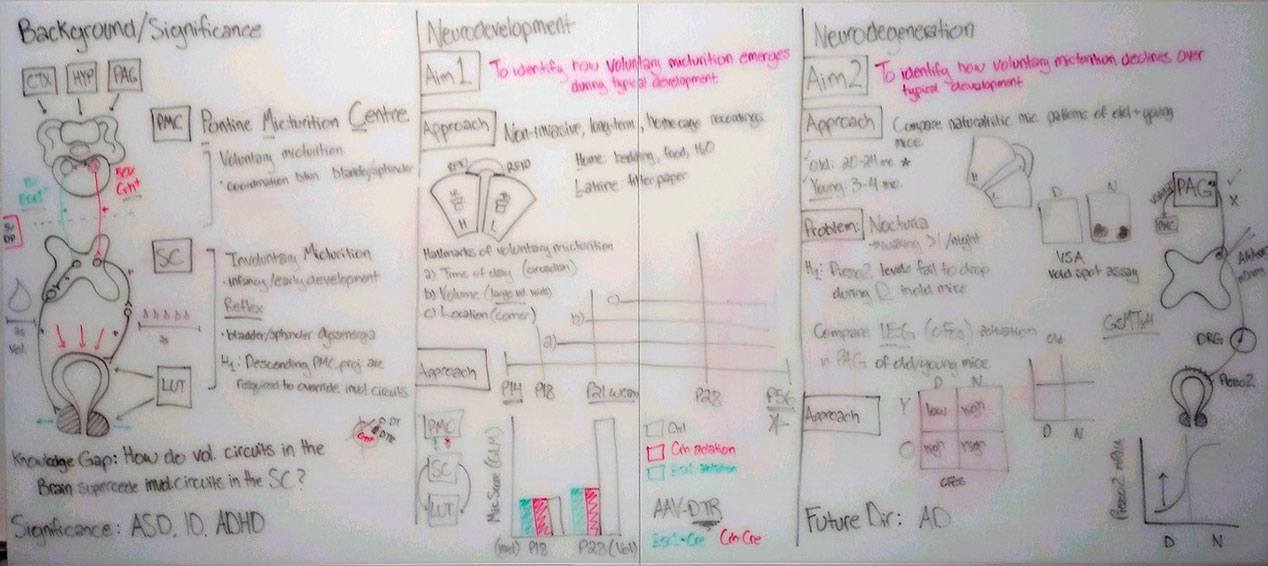Research Project (RP) Grants
Intended to support early-stage investigators who show strong potential to compete for NIH R-type grants. These well-supported 2-year awards are expected to result in substantial research progress and multiple resulting publications beginning in the second year of the award. Prior to the award’s completion, investigators are also expected to be submitting well-crafted proposals to the NIH or other health-related agencies. PIs must commit 50% effort and awards are up to $125K/yr for two years.
Pilot Project - Type 1 (PP1) Grants
Available to early-stage investigators with clear potential but where RP-level funding would be considered premature. In addition, well-qualified early-stage or established PIs who are branching out into new areas of biomedical research will also be eligible for PP-1 grants. Lastly, PP-1 funds may be used as a bridging mechanism to support productive PIs who may be between grants but have a demonstrated history of productivity and grantsmanship. Expected outcomes for PP-1 grants include the submission of at least one manuscript and at least one grant. PP-1 grants may be renewed for 1 year, which will depend on sufficient research progress and compliance with WY INBRE and DRPP program requirements. Awards are $50K/yr and require 25% PI effort.
Pilot Project - Type 2 (PP2) Grants
Intended for biomedical, research-active faculty at all career stages and places a stronger emphasis on the training and mentorship of graduate and/ or undergraduate students, although WY INBRE encourages student participation for all DRPP-funded research (as stated in PAR-23-100). As with PP-1 grants, PP-2 grants may be renewed for 1 year, which depends on student progress, productivity, and compliance. Awards are $35K/yr and require 15% PI effort.
2025–2026 Wyoming INBRE competition schedule:
It was more than a year ago that we submitted our INBRE-5 renewal proposal and we were pleased last October to learn that it had scored well. Admittedly, things took a while after that, but we received our Notice of Award this June and anticipate having funding for at least another 5 years. As always, we wanted to give people a heads up regarding our anticipated schedule of grant competitions for the coming fall and winter 2025/2026. Should you have any questions, please don’t hesitate to contact Grant Bowman or David Fay.
Research Project (RP) Awards
- <$125K/year – 2 years
- Requires 50% effort
- Early-stage investigators only – Focus on developing competitive biomedical research programs
- Formal announcement: Tuesday 8/26/25
- Letter of intent due: Wednesday 9/17/25, 5 PM
- Notification of decision to proceed with full proposal: Before 9/26/25
- Full invited proposals due: Monday 11/7/25, 5 PM
- External reviews due: 12/8/25
Pilot Projects Type-1 (PP-1) Awards
- $50K/year – 1 or 2 years
- Requires 25% effort
- Open to investigators at all stages – Focus on new areas and/or extensions of active research
- Formal announcement: Monday 9/22/25
- Letter of intent due: Monday 10/13/25, 5 PM
- Notification of decision to proceed with full proposal: Before 10/24/25
- Full invited proposals due: Monday 11/17/25, 5 PM
- External reviews due: 12/15/25
Pilot Projects Type-2 (PP-2) Awards
- $35K/year – 1 or 2 years
- Requires 15% effort
- Open to investigators at all stages – Focus on mentoring (e.g., PhD students)
- Formal announcement: Monday 10/13/25
- Full proposals due: Monday 11/24/25, 5 PM
Student Research Program (SRP) Wyoming CC-UW Collaborative Projects
- $12.5k per collaborator per year, maximum of 2 years
- Formal announcement: Monday 12/5/25
- Open to investigators at all stages – Focus on WY community college collaborations, student mentoring, and development of the CC-UW pipeline
- Due: Friday 1/23/26, 5 PM
- See the current RFP for more information or apply via InfoReady
Please note that UW faculty receiving research funding from other NIGMS IDeA programs (COBRE, CTR-IN) are not eligible for INBRE research funding. In addition, faculty cannot receive simultaneous support for INBRE Research Projects (RPs) and Pilot Projects (PP-2 and PP-2). We especially encourage faculty members who have not previously received substantial INBRE support to apply.
Chalk Talks
Primary Investigators with an active Research Project (RP) or Pilot Project-Type 1 (PP-1) award are required to give one Chalk Talk per funded year and attend Chalk Talks as their schedules allow. Previously funded investigators are welcome to join to learn more about actively funded research efforts, such as Dr. Nicole Bedford's research on micturation (Chalk Talk diagram from February 2022 pictured below).

Faculty Contact
Grant Bowman, Ph.D.
INBRE Developmental Research Project Program Director
Professor of Molecular Biology
Grant.Bowman@uwyo.edu

